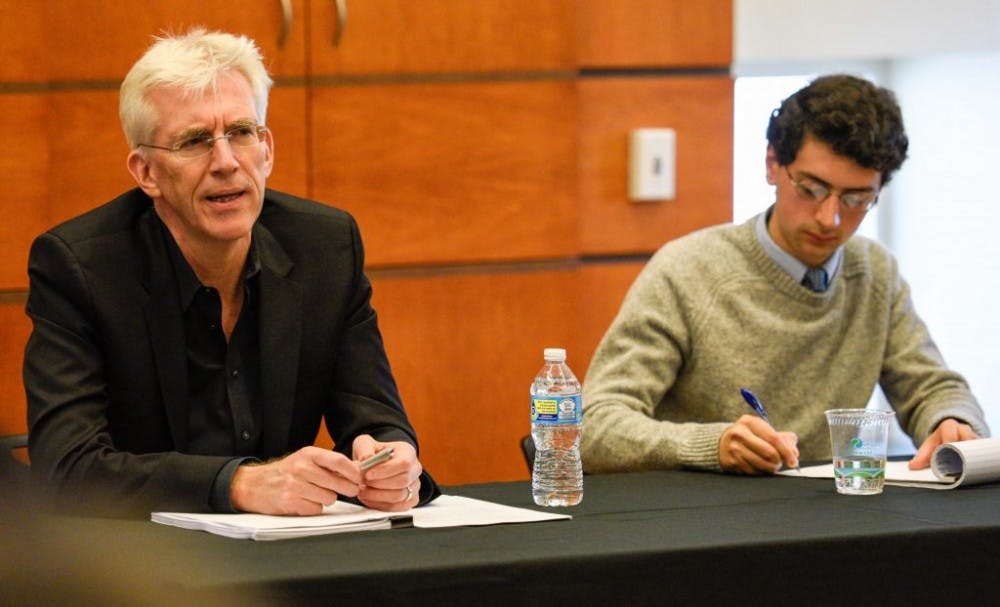With the U.S. presidential election less than one month away, three Hopkins professors discussed the implications of the election on foreign policy and international relations.
The panel on Thursday, Oct. 6 was hosted by the Hopkins chapter of European Horizons and the International Studies Leadership Committee.
The panelists included Steven David, a professor of international relations whose work centers on American foreign policy and security studies; Nicolas Jabko, an associate professor of political science researching neoliberalism and pragmatist approaches to political economy; and Hent de Vries, the director of the Humanities Center specializing in modern European history.
President of European Horizons at Hopkins, sophomore Lucas Feuser, argues that it is important to consider the election’s global impact.
“The U.S. election is very much thought of as a domestic issue,” Feuser said. “But everything the United States does has global implications.”

The panelists and the audience came to a consensus that the Republican nominee, Donald Trump, knows very little about the state of U.S. foreign affairs.
David stressed Trump’s inexperience and carelessness.
“Look at this guy — he’s like a third grader,” David said. “Someone will insult him, insult the size of his hands, and we will be in World War III. He knows nothing about foreign affairs, and what’s worse, he doesn’t care. When he gets a question, to me it’s like a student who hasn’t done their homework. He tries to bluff his way through and BS his way through, and it’s clear he doesn’t know what he’s talking about.”
Senior Olivia Shumaker echoed these sentiments, comparing Trump to Hillary Clinton, the Democratic nominee.
“It’s complicated either way, but I’m comforted by the fact that Hillary has more experience, and she can’t be played,” Shumaker said. “I’m more comfortable with someone who has more experience with what their doing, rather than someone who’s all talk.”
The panel discussed the rise of populism in American politics, and how Trump’s candidacy may pave the way for future celebrity figures.
Feuser believes that populist undercurrents were on the rise long before anyone was aware of it.
“Things like anti-establishment movements, extreme-right political movements and dissatisfaction with the system is a global phenomenon. I feel people are starting to realize that now and equate it with what’s going on across the Atlantic,” Feuser said. “But it was a global issue during the primaries, it was a global issue before and I think that’s only starting to hone in and come home for people now.”

One question asked by the audience was how the European Union and American allies in NATO should respond to a Trump presidency. Jabko spoke about how Trump’s unpredictability makes preparing for his presidency extremely difficult.
“I asked my friend in the French government now what they’re doing in preparation and they’re not preparing because they feel like they cannot prepare for a Trump presidency. I think what they’ll do is react to whatever will happen,” Jabko said. “It could be a president who could lead us to World War III. The other possibility is that the supporters in the Republican party of Donald Trump are supporting him because they hope to be the Dick Cheneys of Donald Trump.”
Sophomore Lexie Botzum said she still hasn’t fully absorbed the implications of Trump’s candidacy.
“They talk about the personality in politics and we’ve definitely had celebrities in prominent political positions before, like Reagan was a movie star. But they have also had previous political experience,” Botzum said. “The fact that someone who has never been in a single office, has never been in bureaucracy, has a reasonable chance of winning the presidency is both horrifying and unprecedented.”
Feuser is still trying to make sense of the phenomenon himself.
“I definitely think there’s a historical wave that people will be able to look back on, realizing that it is as if reality has become distorted and that what we consider normal is no longer normal, everything is warped,” Feuser said. “The whole machinery of the world order is being reinvented to some degree. I think people will look back at this time and say ‘This is when people gave up on dreaming.’”
While many students believe Trump would be detrimental to the future of the United States as a leading world power, some students have a positive spin on things. Botzum is happy that the election has encouraged more millennials to get politically involved.
“This election has kind of become entertainment in a way that previous elections haven’t. I know so many people who aren’t generally politically engaged and know nothing about candidates and political issues, who will post articles about the election and will have discussions about it,” Botzum said. “It definitely has made people more politically engaged. People who previously didn’t care are following candidates and their policies.”
De Vries believes that the election is alarming and that it lacks one key aspect.
“When Obama ran as senator during his first campaign, he had at least two major contributions that were brought to the debates and could be spoken about in more detail,” de Vries said. “One thing that one would say is not playing out in these campaigns, whether it’s Trump’s ambition to ‘Make America Great Again’ or Clinton’s ambition to continue Obama’s legacy and to improve upon it — none of it has to do with hope. Hope seems to be a concept that has been dropped out of the equation.”





